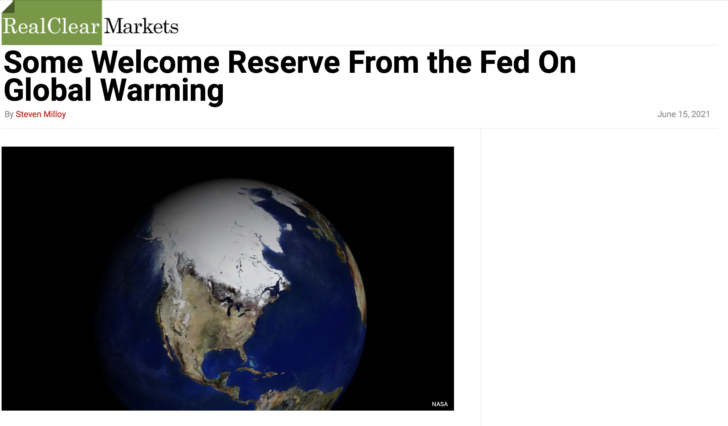My latest at RealClearMarkets.com. Please support JunkScience.com!

Federal Reserve chairman Jerome Powell recently announced that the U.S. central bank will not be implementing climate policy. Such a statement should not be necessary. But it is welcome given the Fed’s recent moves toward becoming a tool of climate activists.
At a meeting of central bank leaders last week, European Central Bank president Christine LaGarde set the tone by stating, “We have to commit now, we have to deliver fast, and I think we have to implement decisively” on combatting global warming.
But Powell demurred, stating “We are not, and we do not seek to be, climate policymakers as such. We have a very specific mandate and precious independence, which we think serves the public well, has served the public well. And I think we should avoid trying to fill in public policy where governments have not done so yet. That’s not up to us.”
Powell is, of course, correct that the Fed mandate to “promote effectively the goals of maximum employment, stable prices, and moderate long term interest rates,” says nothing about working to achieve the proper global climate, whatever that may be.
The other key point he made is that the Federal Reserve is independent in that it is not tasked with implementing the economic plans and goals of the President.
The situation with other central banks is different as they often have a secondary duty of implementing the will of their governments. And if that will relates to climate, then that becomes a task of the central bank.
Although all this seems plain and simple enough, the Fed has been nonetheless pressured by activists into considering what to do on climate.
The Fed first waded into climate last November in its semiannual financial stability report, speculating on how climate change might cause financial instability.
Then in January the Fed created a committee to improve its understanding of the systemic financial risks that climate change might pose. It created a second climate committee in March.
About this time, six Republicans on the Senate Banking Committee wrote to Powell warning the Fed against involving itself in the setting of climate policy. They noted the central bank’s lack of expertise in climate, the uncertainties involved and the fact that local banks are best equipped to judge the risks to their lending from weather-related events.
In April, Powell nevertheless seemed all in on climate telling the Economic Club of Washington, “The reason we’re focused on climate change is that our job is to make sure that financial institutions, banks, particularly the largest ones, understand and are able to manage the significant risks that they take.”
But Powell seems to have reversed course and removed the Fed from climate policy setting at least for now.
So what is it exactly that climate activists want the Fed to do on climate? They want the Fed to make business more difficult and less profitable for commercial banks that finance fossil fuel projects.
This could be done, for example, by raising the capital requirements (minimum amounts of cash banks must have on hand) for banks who finance fossils fuel projects. This would lower commercial bank profitability by reducing the amount of money they can lend. The climate activists hope this will eventually dry up money for fossil fuel projects.
Powell possibly now realizes the foolishness of that scheme since the actual losers would be commercial banks forced to forgo profitable business and consumers forced to pay higher prices because fossil fuel companies had to pay more for non-bank financing.
Our world depends entirely on fossil fuels and making them pointlessly expensive is just bad economics.
But don’t the other central banks realize this? Of course, they do. But their governments don’t care. The rest of the world has always hoped that climate regulations (and ensuing higher energy prices) would hamstring our economy and make the US less economically competitive.
The battle to keep the Fed out of climate is not over. But at least for this week, it is headed in the right direction.
Steve Milloy publishes JunkScience.com and is the author of “Scare Pollution: Why and How to Fix the EPA.”